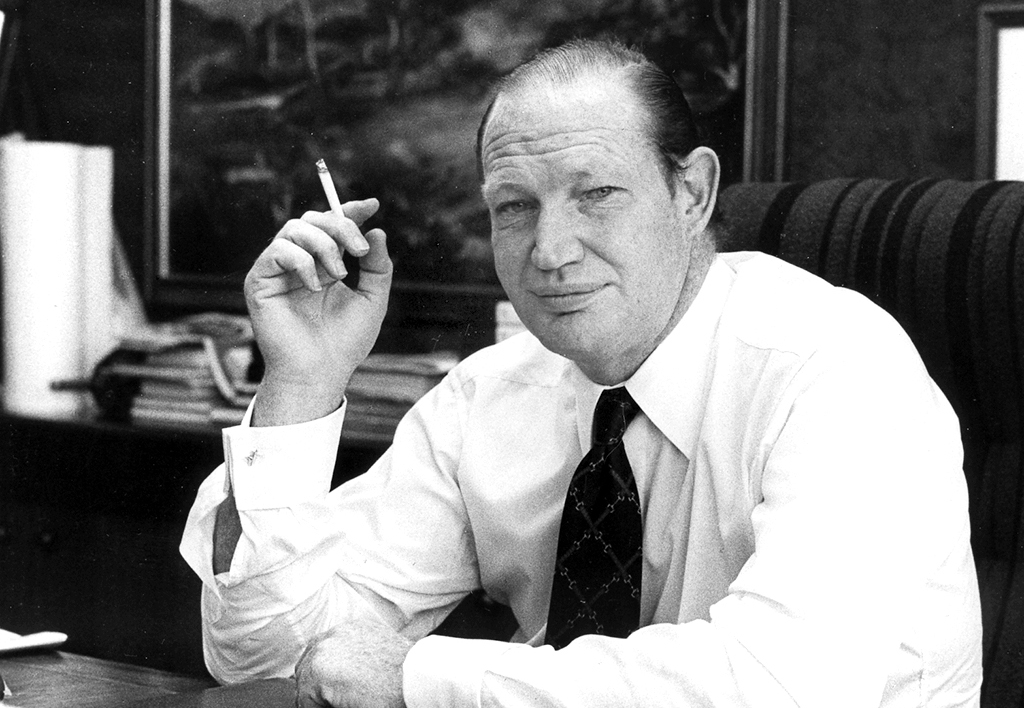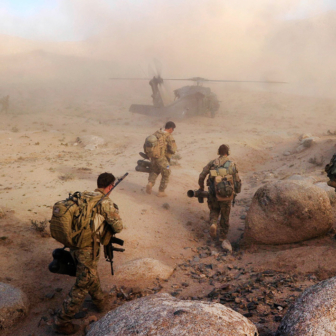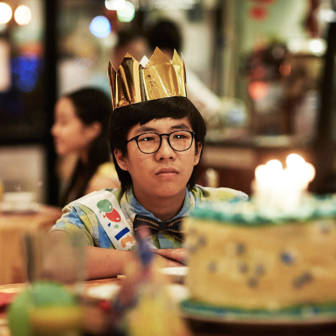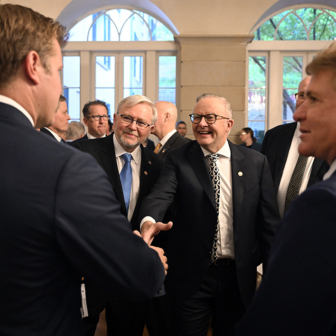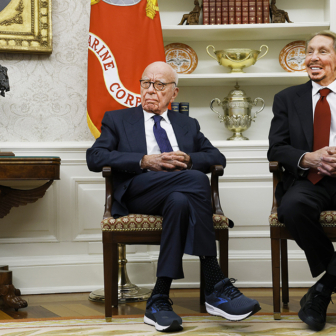In 1978, in the midst of the World Series Cricket controversy, Melbourne broadcaster Terry Lane recorded an interview with Kerry Packer in which he spoke for the first time at length about his childhood and particularly about his father, the founder of Australian Consolidated Press, Sir Frank Packer. A version of the interview, edited in consultation with Kerry Packer, appeared in Terry Lane’s book The Twig is Bent, published in 1979. This is the unedited recording, and the text of the chapter is below.
Because this interview was not recorded for broadcast, the interviewer’s voice is indistinct at times
TO TELL about my childhood I must, right at the beginning, say something about my father. I believe that in every generation there are great and outstanding men, and that perhaps there were sixty or seventy or one hundred other men born in Australia about the same time as my father who were capable of creation. They’re not always lovable or understood by the public, but for a man to be great he has to have a lot of compassion and understanding. He’s usually busy, and that creates conflicts. But, nevertheless, my father was a great man. The best way I can describe such men is to say that there are any number of people who can go out and fly a jumbo jet, but there’s a very elite group of people who can design it and make it work, and my father was a designer and a person who could make things work. If I’ve had any success it’s because I was able to fly the plane he built, but I couldn’t have built it.
My father built Consolidated Press from nothing. At about twenty-odd years of age, when he was a journalist, he got what he was going to get as an inheritance, which was, I think, about ten thousand quid, and he came out and started Consolidated Press. He got lucky, and nothing works in life without luck. It’s the ultimate thing and the greatest man in the world gets nowhere without it. He should have gone broke, but he had lucky breaks and things fell for him the right way.
So, what was my father? What were my feelings towards him? I was a bit scared of him. He was a strong man. He was a just man. I remember in my early life (he was a great believer in corporal punishment, as I am) he took me aside and said: “Sometimes I have a bad day at the office and I’m angry. I’m going to come home, and if you believe that what you’ve done isn’t worthy of the punishment that I decide you should have, you can have a stay of execution. All you’ve ever got to say is, ‘Look, I think you’re in a bad mood and I’d like to discuss it with you tomorrow,’ and that’ll stop it.” He said that it may not alter the punishment – that he may decide on the next day that I was wrong and he was right – but I had that option. And for a man who was supposed to be tough I don’t ever remember one occasion on which I used the stay of execution. I got a lot of hidings, because that’s the sort of person I was and the sort he was. I don’t ever remember getting one I didn’t deserve and there’s a stack I didn’t get that I should have got.
He wasn’t a family man – he was a creator and he paid the penalty of all those who create. He devoted up to twenty hours a day to his business until he had built it. There are a lot of stories about him being a tough, hard man who wandered around the building turning lights off. And I’m sure you’ve heard the stories about how he used to personally sign the petty cash dockets. He did all those things for the reason that he never knew if he was going to have enough money at the end of the week to pay everyone. Those were habits which became ingrained in him for the best of reasons: he had to survive. They became something that was a bit funny when things weren’t that tight, but he couldn’t help it at that stage.
I don’t want you to think of him as a mean man; he wasn’t. He was probably the most generous man that I’ve ever met, but he believed that you run a business as a business and you run it efficiently, and you run it tight and you run it hard. But in personal life he was the most generous man. If any of his friends had a problem or needed help he was always the first man there. Very quietly. I think he believed, and I believe (I’m sure I got it from him), that if you were lucky enough to have a few bob then you should be as hard as is right within the organisation but if you’re mean with it in your personal life then you’re the lowest form of animal life. You divide yourself into a personal life and a corporate life, and in the personal life you’ve got friends. You can’t get blood out of a stone – if a bloke hasn’t got any money and doesn’t shout that’s because he can’t afford to, not because he doesn’t want to.
My father had a lot of influence on me in my early life. It would be pretty presumptuous to claim that I inherited any of his characteristics. I’m a great believer in the effects of environment. I was lucky enough to see my father running the business. I saw him on the telephone to the office every time I was home for twenty-three or four years. I saw his decision-making processes. When I came to work at eighteen I had already been exposed to the business for twelve years. That was what the house revolved around. Whatever concessions had to he made to be efficient within that business area I’d seen him make them. His attitude was that the job comes first and you’ve just got to get it done and it doesn’t matter if it’s three o’clock in the morning. I think it’s a tremendous edge for anybody who starts off in life to see that sort of thing because it allows them to understand that you don’t get there just by luck. You get there by being lucky but then accepting your luck and trying to make it work.
I went to boarding school in Sydney when I was about five for a short time and then when people thought the Japanese invasion was imminent I was sent to live with my mother’s sister and two kids in Bowral and I went to school there. It was wartime, of course, and hard to get into a school, so I went to a girls’ school with my aunty’s daughters. I lived there for two years until one morning I got out of bed and just fell flat on my face. I had polio and rheumatic fever and I was sent straight down to Sydney. They put me in hospital there for about nine months in an iron lung. I don’t remember much about it except having lumbar punctures – that’s the most vivid recollection. When I got over that and made a good recovery I was sent to Canberra, where the company had a place. The altitude was supposed to be the right thing for what I’d been through, so I was sent there with a nursing sister. I was lucky that my problem was diagnosed quickly and that I didn’t try to strain myself, because I understand that’s where the damage is done. But I couldn’t walk and they thought I was trying to get out of school, because I loathed school.
I was academically stupid and my way of surviving through school was sport. I used to play everything. I was never a great natural talent, but I worked hard at all the sports that I played and I became reasonably competent at all of them. There’s no point in being stupid about it – I’ve got a good ball sense, whether it be from playing polocross to tennis, cricket, to football, whatever it is. I lived my life for sport.
In Canberra, where I was looked after by the nursing sister, I went to a public school, but I was obviously behind in my work. Then they got me into Canberra Grammar for a while and at the end of two years I came back to Sydney, and that’s really the first time that I remember living with my parents. For the four years since I had been sent to Bowral I had seen nothing of them, except for seeing my mother perhaps half a dozen times. It was the war and my father was working for the army and my mother worked hard in the Red Cross. It wasn’t a matter of their not wanting to see me, it was a matter of getting on and doing things, which is something that I believe was right. I think they had to.
The most influential adult in the first few years of my life was my mother’s sister, Mary Horden, who was a wonderful woman. After that there is a vacuum. The nurse, who was a nice woman, didn’t really have a lot of influence. That was a fairly lonely, difficult period. Then when I went back to my first school, when I returned to Sydney, I was hopelessly behind everyone else and became a bit of a laughing stock because of it. My method of fighting against that was to devote myself to sport, where I had more ability than most.
Being an academic failure was very painful and this was a very tough period for a kid. It was probably the hardening of the shell, because kids are pretty unkind to kids. After a few years at Cranbrook, where I wasn’t doing very well, I went to Geelong Grammar on the recommendation of the headmaster of Cranbrook. He said that we should try to get into Perry House because that was run by a man called Tunbridge who, I believe, is one of the giants of the education system. As fine a man as I’ve ever met, tough as billy goat’s knees but dead straight. I’ve got great admiration for Tunbridge and he was obviously very influential in my life. I don’t know that he’d be proud of my saying that, because I don’t think the things I stand for are the things he stands for, but he became an influence. I was twelve or thirteen when I went to Geelong and I used to see my parents only at the holidays.
My mother was one of four daughters in her family and a woman of beauty and intellect. She was devoted to her husband. He came first, as is right. I don’t mean by that that she neglected us – she didn’t. She believed that her function in life was to look after my father and I don’t disagree with that. I think you do what you can for children, but you don’t want to devote your life to them. When they grow up, as they must, and move away from you, as they should, an enormous vacuum appears. So I didn’t really see much of my mother or father until I left school.
I had a disrupted childhood, which was nobody’s fault. It wasn’t a matter of neglect, it was a matter of circumstances. My father worked bloody hard to survive and I didn’t see him because he paid a price for success. That price had to be paid in the Consolidated Press building in long hours. He had a morning paper, and that meant he used to go in there until eleven o’clock at night and of course he used to sleep in to nine o’clock in the morning, by which time I’d be at school. It wasn’t that he didn’t adore us, he did. Life’s like a see-saw to me: if you get it that end, then you’ve got to pay for it this end, because one side goes up and one goes down. And he was a competitor; he couldn’t help it. He had to get in there and fight.
How do I bring my own two children up? Well, funnily enough, I spend pretty long hours in the Consolidated Press building too. I want them to know only one thing, really – that I adore them. I’d do anything for them and they know that. They know they’re loved. They’re excited and happy to see me as I am to see them. That doesn’t mean I don’t put them over my knee – I do, but I hope fairly and never in anger. It’s a belief that when you’ve done something wrong you’ve got to pay a price. Then we talk about it after it happens and say, “It’s paid now, but let’s learn the lesson and not do it again.” My children have been lucky in life. I have a wife who has brought the children up and she’s done a fine job. They really are great kids. I’m very proud of them and I’m proud of her, because she’s the one who’s done it. You’re very lucky in life if you’ve got good kids and a good wife.
THE quality or characteristic which I think I have learned from my father and other people who have influenced me, which I think is important, is loyalty. You have to give loyalty in order to receive it. I believe you offer loyalty to everyone, which is not as big a strain as it sounds, because very few people pick it up. It’s a two-way street. It’s looking after one’s friends when it is inconvenient or difficult for you to do so. Anyone can look after someone if it’s no problem, but it’s real loyalty when you have to choose between something which you wanted or wanted to do, and their need. Then you have to choose to serve their need. I believe that’s above everything else. You kid yourself if you think you can buy loyalty. You can’t. You earn it through consideration and through being there when other people need you, regardless of what other commitments you have. I believe that you’ve got to be true to your beliefs, loyal to your friends and be a winner.
As I said before, I know full well that I couldn’t have done what my father did – build a great enterprise from nothing. I don’t have those talents. I realised early that it takes a certain type of man to do what he did and I don’t look at myself as a failure because I can’t measure up to him. He was one of the exceptional people and I think you’re damned lucky if you know one and you’ve seen how they operate. Just having known such men gives you a tremendous edge, which in itself should be enough without ever trying to aspire to be what they are, because you won’t be. You’ll fail, and that’s the thing that cuts people around – the fact that they think they could have done what their father could have done, and not realising that it is a gift which is given to very few people. Don’t feel ashamed if you’re not given it.
My father was a gambler. Every man who ever created anything was a gambler. I am, also, but there’s a difference. What I risk on World Series Cricket is not going to put this company into jeopardy. It’s not going to send it broke. I could close it down and the place would not even hiccup. What my father did was to take everything he had, all the prospects of everything he ever had and put it on one roll of the dice. And what happens with great men and creators is that they work so hard with so little. They’re always undercapitalised at the beginning and they take the most outrageous risks. Against all the odds, and with luck, they survive. Then eventually they get to an age where they’ve built something and they sit back and say: “I’ve done it!” And the next risk comes along that thirty years ago they would have pounced on, and they say, “I don’t want to put everything on another roll of the dice”; and they get conservative. Maybe they feel they’re not young enough to do it again. They don’t want to play the game any longer, but to sit down and consolidate. Then, in their offspring is the same type of conservatism. They too don’t want to risk everything. Now I might risk more than the next guy, but I’ve never risked the lot. I’ve never risked anything that’s going to put Consolidated Press at risk; might knock it around for a year or two, but we don’t take the sort of risks where everything depends on it going right.
I believe I was a pretty lucky child. I was born with all the advantages – all the good things that could happen to me did happen. I had a bit of sickness, but how lucky I was to be able to get the right doctor. How lucky I was to be able to get into the right hospital. How lucky I was that I wasn’t left with any scars. I can’t tell you the happiest memory of my childhood, but I was lucky enough to have fantastic parents. Not in the run-of-the-mill interpretation of “fantastic,” but parents who, I think, had qualities which one was very lucky to see.
If I have one unhappy memory of childhood it was the loneliness. The opportunity to make friends wasn’t there. I was continually moving, and even a couple of good friends I made at Geelong live now in Victoria, so I don’t see them and we have obviously drifted apart. So I don’t have friendships from school that go right back, because I was never there long enough, and that’s a hard part of my recollections. Some of the holidays were lonely because of those sorts of things, but that is the luck of the draw. If I hadn’t been sick and there hadn’t been a war on it mightn’t have worked out that way. But it did work that way and I don’t feel lonely now. I’ve got a few mates who are very important to me, whose company I like, whose opinion I respect and whose friendship I value.
Then I suppose one could say that there’s maybe one or two people out there who don’t approve of me, but my early existence insulated me against those people pretty well. Maybe that was the way it was meant to be. •
